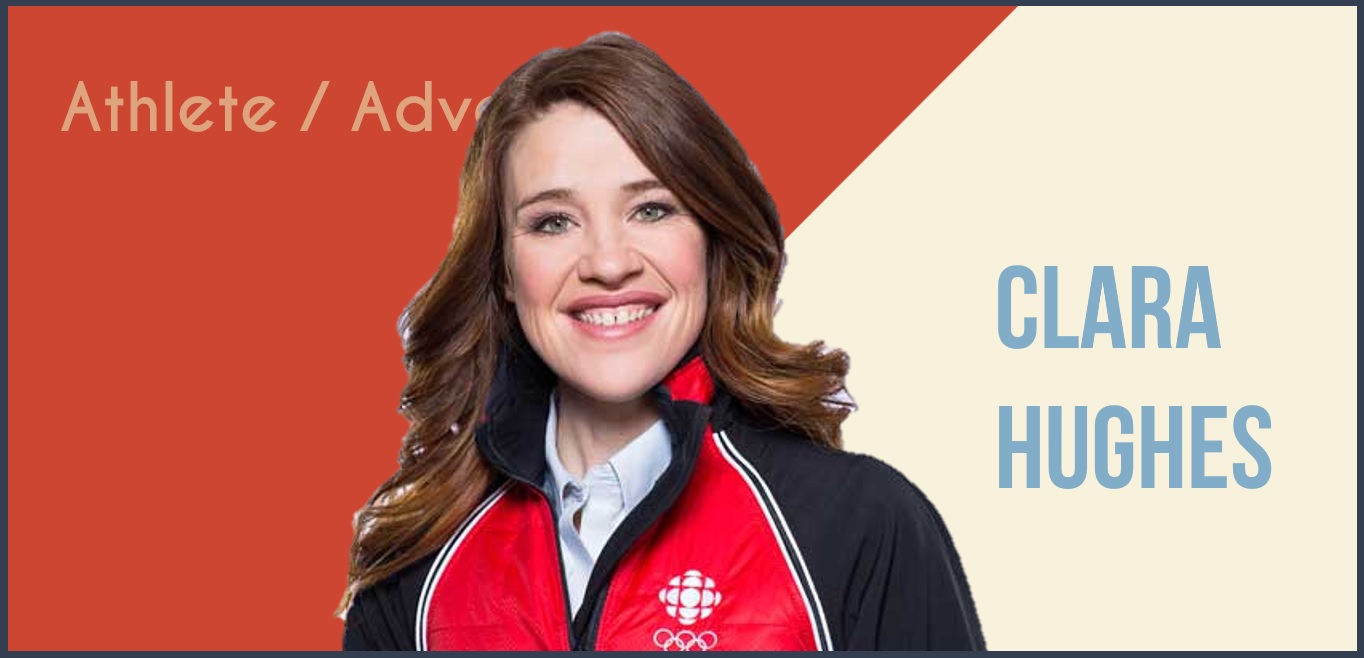Vocabulary
Before reading, translate these words.
Skip school
Take up (something)
Get into it
Straight-A student
Disciplined
Strict
Clean up your life
Calling (noun)
Emotional support
Flag-bearer
Accomplished (adjective)
Advocate
Stigma
Underprivileged
Humanitarian
Biography
Early Life
Clara Hughes was born on September 27th, 1972, in Winnipeg Manitoba. She did not consider herself an athlete when she was growing up. Her father was an alcoholic and her personal life wasn’t good. Her parents divorced when she was 9 years old. When she was young, she smoked cigarettes, skipped school, drank alcohol and did drugs. On the weekends, she wouldn’t go home even though her mother was worried about her. Hughes just didn’t care until sports became a part of her life.
Speed Skating
She was inspired to take up speed skating after watching Gaetan Boucher compete at the 1988 Winter Olympics. She told her mother that she wanted to become a speed skater at the Olympics. Her mother made some phone calls and got her into the Winnipeg Speed Skating Club training program. Hughes turned her life around. Instead of failing all her classes, she became a straight-A student. She also cleaned up her life.
Cycling
While she was training for speed skating, she met Mirek Mazur. He was a cycling coach but asked Hughes to join his team. He had strict rules and expected her to be well-disciplined. Hughes believes that she was lucky to have someone challenge her the way he did. Mazur challenged Hughes to cycle 23,000kms per year.
Hughes won her first major award when she won the silver medal in the 1991 Pan American Games. She won the medal in track cycling. Later, she won a bronze medal in the 2002 Commonwealth Games and a gold medal in the 2003 Pan American Games.
Hughes was more successful in road cycling. She participated in the Tour de France four times. She won the 1994 Women’s Challenge and the 1997 Liberty Classic. 1995 was a good year for Hughes. She won a silver medal in the World Championships to go along with her silver and bronze medals in the Pan American Games.
In 1996, Hughes participated in the Olympics for the first time. She won two bronze medals for road cycling. She was just the second Canadian to win medals in cycling at the Olympic Games. Even though she continued to cycle, she felt a calling to go back to speed skating. She was also dealing with a lot of depression at that time. She married Peter Guzman. He was her emotional support as she dealt with her mental health issues.
Speed Skating Again
In 1998, Hughes got back into speed skating. She focused on the 5,000m race and she was quite successful. She won a bronze medal at the 2002 Olympics. Then, she won gold at the 2006 Olympics and another bronze in the 2010 Vancouver Olympics. She added one more silver medal at the 2006 Olympics in the Team Pursuit event. In 2010, the Olympics were in Vancouver, Canada. Hughes was selected as the flag-bearer for the opening ceremonies. After she won the bronze medal, she knew that she was finished in speed skating.
Olympic Legacy
Hughes went back to cycling the next year. She competed in the 2002 London Olympics and finished 5th. That was her last competition for a while. Hughes is the most accomplished Canadian Olympic Athlete with 6 total medals (2 in cycling, 4 in speed skating). She is one of six people who has won a medal in both the Summer Olympics and the Winter Olympics.
Mental Health Advocate
That is not the end of this story because Hughes’ impact on Canada was not just in athletics. She also become a strong advocate for mental health. She began talking about her issues with depression in 2011 and became the spokesperson for Bell’s Let’s Talk campaign. Her goal is to eliminate the stigma associated with talking about mental health. A lot of Canadians have found the strength to talk about their issues thanks to her.
In 2014, Hughes created and completed “Clara’s Big Ride”. It was a 110-day cycling tour through every province and territory. It covered over 11,000 kms and 105 Canadian communities. Along the way, she stopped to talk about mental health and participate in events to encourage open dialogue and discussion about mental health.
Hughes continues to be a strong advocate for mental health. She is also a supporter of Right to Play. It is an organization that uses sports and games to help underprivileged children learn life skills and overcome challenges. Hughes had an impressive athletic career, but she is most known for her humanitarian work.
Questions
The questions will guide you through the reading and give a deeper understanding of the text
- Where was Hughes born?
- Describe her life when she was young.
- Who challenged her in cycling?
- What is the difference between track cycling and road cycling?
- How many Olympic medals did she win in cycling?
- How did she feel after the 1996 Olympics?
- When did she get back into speed skating?
- How many medals did she win in speed skating?
- How many people have won medals in the Summer and Winter Olympics?
- What mental health issue did Hughes deal with?
- When did she start talking about her depression publicly?
- What was Clara’s Big Ride?
- Watch this interview.


